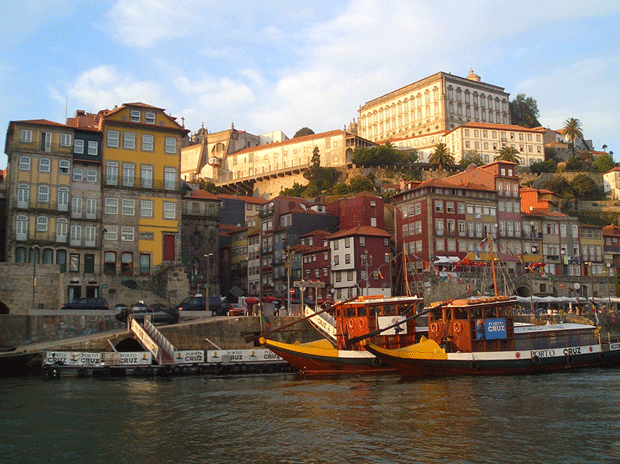“It reminds me a little of Varanasi,” says my husband thoughtfully as we drift slowly along the river. I gaze upon the rows of colourful old buildings, four- to five-storey high with laundry lines permanently hanging from the balconies, and can’t help but agree. Old wooden boats float past us. The setting sun casts a pink glow over the water. As the lights on either side flicker to life, we disembark the boat, settle down at a riverside café and order chorizos with chilled Super Bocks. As the sausage arrives, sizzling over a pan of alcohol that the waiter skillfully sets alight on the table, the resemblance to Varanasi ends. Two young boys run past us, passing a football back and forth. Across the river, the Zorro-like silhouette of Sandeman comes ablaze with light as ruby red bottles of port emerge from their shelves in tavernas. We’re in Porto, the second-largest city in Portugal, and life’s good.
Redolent with history and the best of Portuguese architecture, Porto is an ambler’s delight. Few other cities in Europe rock that “faded grandeur” look quite like Porto does with its curious mix of Baroque and Neoclassical architecture, all in varying degrees of preservation. I find myself in awe of the beautiful azulejos, traditional painted tin-glazed ceramic tiles adorning old churches and even its main train station, Sao Bento. However, one place draws us back again and again.
Ribeira, Porto's riverfront
Lovely old boats, barcos rabelos, which once ferried wine barrels from the valley, now offer cruises for tourists. But we somehow feel rather rooted to our tavern chairs. It helps that Porto is one of those comforting places that doesn’t have any of those tiring “must see” landmarks, leaving us free to laze about and along the Douro. As the hot August sun lulls us into a state of drowsiness, I watch young men dive into the river from the bridge. A droplet of water falls from the skies and I look up to see a Portuguese matron hanging up her washing over a quaint handicraft shop. I shift my chair to peep into a narrow lane and wonder at how easily the daily lives of Porto locals blend with the hedonistic world of tourists.
Some of the best things to carry back from one’s travels are the ones you don't need cash for — and I realise that I’ll leave Porto with an abiding love for a music that will always remind me of it. I wonder as I get on the plane if I’ll ever visit Porto again, for the world is full of too many undiscovered places and life is short. Then I sigh, for I finally understand a little more about the state of mind that Portuguese saudade speaks of.

)
